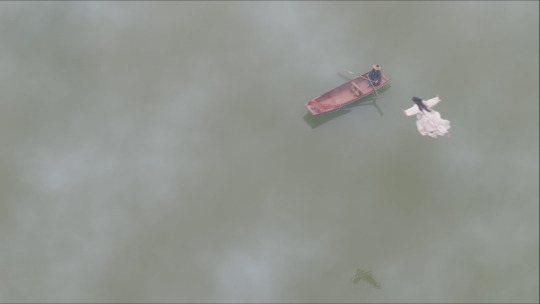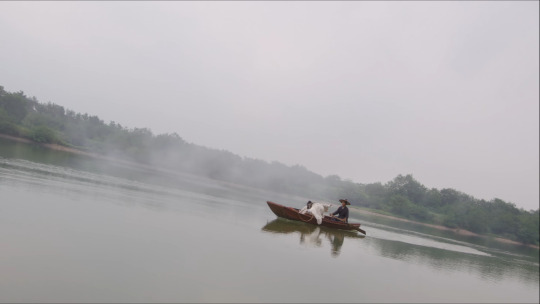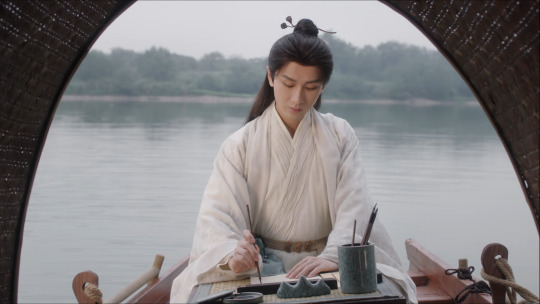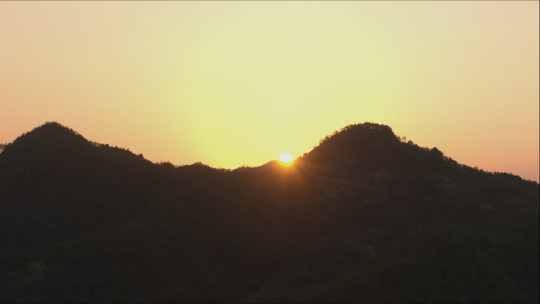#anyway...... lxy/llh's buddhist arc is very profound and meaningful to me
Explore tagged Tumblr posts
Text
to fulfill my promises to @ananeiah and to expound on @seventh-fantasy's post, there are many conceptions of enlightenment. because buddhism is a massive and old religion with a very robust canon, enlightenment goes by many names, it's articulated and imagined in many different ways. let's play the game of how many of them are adopted by the show...
popular metaphors that embody enlightenment include a refuge, a flame going out, or a firm island - because this world is often described as an ocean. all human beings are floating in the 生死苦海 sea of rebirth and suffering. to escape it, one must make their way to the island or to get on a boat. mahayana buddhism (aka. chinese buddhism) is literally named 大乘 the great vehicle, the primary idea being that enlightenment = to board a vehicle of transport, it will take you away. however, buddhism doesn't just envision this as an ambiguous vehicle. 乘 the vehicle specifically refers to a 船 boat.
the mortal world and the cycle of suffering is a sea and the way out is enlightenment, envisioned as a boat.




an extension of this is the concept of 彼岸 the faraway shore (alt tl: the further shore, the distant shore, the other shore, or at times the opposing shore). it draws on the same notion of 苦海 the ocean of suffering. to achieve enlightenment is to swim to shore, where there is finally safety and stability, free from suffering. this is why the euphemism for enlightenment is to 度到彼岸 reach the faraway shore.
此岸 this shore, is this ever-changing world full of agonies. you wade across the 苦海 sea of suffering, and reach 彼岸 the faraway shore. this is enlightenment.
as @seventh-fantasy depicts in this post, the final shot of ep 40, and as seen in the bonus ep 40.5, this is where llh is. ep 40 ends with the camera moving further into the distance, moving further into the sea. and the bonus ep 40.5 makes it clear again that lxy/llh has found his way to a different beach. llh has crossed the sea to another beach. he is on another shore, the 彼岸 faraway shore, far from 东海 the east sea where everyone else is.
let's look even closer at this.
enlightenment is also conceived as a place: 淨土 the pure lands, 极乐世界 the realm of greatest bliss, and so on. one of the geographical markers of this idea is 西 the west. this "land" accessible only to the enlightened (佛 buddhas, 菩萨 bodhisattvas, and 阿罗汉 arhats) is also dubbed 西方淨土 the western pure lands and 西天 the western heavens, etc.
enlightenment is imagined to be westwards. the opposite direction and away from 东海 dong hai = the east sea. where the story began and lxy famously plunged into; he fell into the 苦海 sea of suffering located in the 东 east. from this starting point, llh makes a meandering journey to his final location in the show. he makes his way 西 west, towards enlightenment, and reaches a 彼岸 faraway shore, the enlightened "after" and what is beyond.
now that we're on the topic of the pure lands, it's worth mentioning that this concept is furnished with a lot of descriptions in buddhist sutras. it is a beautiful, glorious land brimming with lotuses. because, of course, the lotus is yet another ubiquitous image that represents enlightenment.
the lotus position is crucial to the buddhist practice of prayer cultivation, especially in 禅宗 zen buddhism that is built around the central practice of prayer. lotuses are motifs in buddhist art, and buddhist myths (the legend goes that lotus flowers bloomed under the buddha's feet when he took his first steps as a child). people practicing buddhism are referred to as 莲友 lotus friends, 芬陀利花 the white lotus is a synonym for the buddha. lotuses are also integral to buddhist canon; the pure lands are detailed to have seven 宝莲池 treasure lotus ponds. every buddhist has their own lotus waiting for them in the pure lands; it is believed the more you cultivate, the more your bud in the pure lands grows/blooms.
of note, every living thing residing in the pure lands are made from lotuses. in fact, buddhist canon states that the enlightened are reborn inside a lotus bud, similar to an incubation. their new body is reconstituted from lotuses and they emerge anew when the bud blooms. crucially, it is also stated that every enlightened in the pure lands will have 莲花座 a lotus seat. this is a vehicle of transport, usually likened to the magic carpet from one thousand and one nights. it is described as 随心所欲、飞翔自在 something that acts after your heart's desire, something that flies free. the lotus seat is about boundless, freeing travel.
this isn't comprehensive at all, there are tons of other ways lotuses come up throughout buddhism. but the connection to the show is straightforward and self-explanatory. the primary motif in 莲花楼 mysterious lotus casebook is the lotus - a famous marker for buddhism itself. one of the dominant illustrations of enlightenment, the cultivation process to achieve it, and enlightened entities themselves.
the buddhist notions of rebirth are similarly heavily intertwined with the lotus. it is your body; you become it, it becomes you. from then on, you are surrounded by its image and its presence. you even have a lotus vehicle that becomes your main method of travel, a mode of travel defined by carefree contentment. sound familiar? llh's identity and his living carries major markers of enlightenment. it is one of the primary concerns of his character arc.
quick detour. a prominent moniker for enlightenment is the setting of the sun, as yet another epithet utilized by the drama.


detour over. crazy connections time.
discussions of death and suicide is, to my knowledge, particularly prominent in japanese buddhism. but as a whole, a significant portion of buddhist canon and a good number of buddhist media deals with this too. dying as a means to get closer to enlightenment, equating death and enlightenment, the subject of suicide itself. characters seemingly pass away and become enlightened, or characters strive for death with this express purpose as death is connected to enlightenment. this is true. one does not necessarily cause the other, but the concepts are interconnected in buddhism. it comes hand in hand, dissecting one means dissecting the other and vice versa.
most buddhist texts and masters do not condone a direct correlation, suicide is not the way to enlightenment. there is no buddhist value to killing yourself. but the key exception lies in one of the most important buddhist texts: the lotus sutra.
"These include several themes dealing explicitly with death, such as how suicide was committed to speed up rebirth in the Pure Land based on the sanctioning of voluntary death as a superior form of sacrifice in Chapter 23 of the Lotus Sutra ..." [1]
the chapter 23 in question talks about a bodhisattva who turns himself into a human candle and burns himself up, in offering to the buddha. there is more to the story, but it mainly functions as a lesson about cultivation and enlightenment.
in the canon about buddhist suffering, there lies a subset dedicated to physical pain and torment. there is a heavy focus on our 5 senses, specifically (that's a whole separate topic i won't go into here). very briefly, to suffer is to experience the world through our 5 senses. to live as a human being is to suffer in a sensory way.
buddhism aspires to transcend this flesh and blood suffering. so annihilation of one's body is an essential step to achieve enlightenment. usually, this theory centers natural death and decay. you accept that you are always aging, your senses will lose their edge, your body is always subject to illness, injury and other failings. let the body waste away, it will do so regardless.
hence, the human body is set on a course of gradual deterioration. this suffering is processed through our 5 senses and is defined by them. in the face of this, the lotus sutra is the only notable buddhist text that looks kindly upon "voluntary death" to transcend it.
similarly, llh accepts the effects of bicha on his body. it mimics the natural decline of the human body, accelerating the degradation of his senses, his immune system, and his physical capabilities in general. his experience of this form of suffering is also emphasized through a period losing his sense of sight. it is a very buddhist torment. but at the end of the day, it is still a man-made, unnatural cause generating this effect. accepting this is not the same as accepting 生老病死 death via age, sickness and other natural processes.
llh embodies the sentiments and themes in the lotus sutra when he consciously chooses to let bicha run its course. he chooses to die, it is a "voluntary death". let this destroy his body. let this suicidal choice (though its more nuanced than simply suicide imo) free him from buddhist physical suffering. thus bringing him closer to peace, a version of himself that will be happier.
finally, enlightenment is about ambiguity.
凡人 the common people are incapable of comprehending enlightenment. it is understood that the human senses and the human mind is too inept and unrefined, too clouded by illusions, to grasp it. there are a million ways to express it, depict it, and name it. but there is a consensus across buddhism that these are simply aids for the common student of buddhism, and they are not accurate to the truth. at the core of enlightenment is an abstraction, an inherent unknowing.
it is, by definition, a departure and a continuation. it is a removal from this world and a transition into another place, another realm. all at once, the phenomenon straddles a greyness between an ending and a beginning. it is unclear whether the enlightened has left, or is it the common man who is so lacking he cannot recognize or even perceive the enlightened? in the theory of enlightenment, buddhism accounts for both factors. but we will never know for sure.
where do the enlightened go? where are they, where have they gone? these are questions buddhists often ask and explore, and it is also the question that the remaining cast engages with. what is enlightenment, exactly? there is a suspicion, some notion of what must have happened. it might be death, it might not be. only the enlightened can answer this, everyone else is left without clarity.
in the end, the seekers get close to the answer but there is no real fruition. and so the search lasts indefinitely.
that, too, is part and parcel to enlightenment.
as for how enlightenment narratives function, i leave you with this.
"Nirvana provides the full stop (period) in the religious story; it gives what one might call, to use Frank Kermode's well-known phrase, "the sense of an ending" - that is, a real ending and not a mere breaking off. Such an ending is only possible within a narrative.
[...]
Nirvana, I want to suggest, is a moment within a discursive or practical dynamic, a formal element of closure in structure of Buddhist imagination, texts, and rituals. One might say that nirvana has primarily a syntactic rather than semantic value: it is the moment of ending which gives structure to the whole. The fact of narrative structure and closure provides a meaningful and satisfying resolution, although in itself nirvana has merely the formal value of a closure marker.
[...]
Earlier I called nirvana the full stop (period) in the Buddhist religious story; now I can add that it is a full stop in an eternal story, a full stop which brings closure to individual lives in a master text which itself can have no final ending." [2]
Sources:
Tragedy and Salvation in the Floating World: Chikamatsu's Double Suicide Drama as Millenarian Discourse by Steven Heine ↩︎
Nirvāna, Time, and Narrative by Steven Collins ↩︎
#莲花楼#im exhausted and busy#but got caught up in doing this post anyway#deciding to look into what english buddhist canon has going on has led me down a rabbit hole#anyway...... lxy/llh's buddhist arc is very profound and meaningful to me#there's a lot of other buddhist theory i couldn't and didn't really want to get into#but i want to keep this post as just a list of enlightenment themes in llh's story#i wish i could get into like......#eg. enlightenment is a very very varied & diverse concept actually and there are different definitions of it#eg. nirvana isn't a place or something you “enter” or a stage you break through into#even though that's how it's often expressed#it's just a very tricky thing to convey#which is why there's like a 238912839 different names and allegories and euphemisms and metaphors for enlightenment#ambiguity generates people throughout history trying to bridge this gap in knowledge#and i'm so glad that quality was taken into account in the show#some might even say it is enlightenment's defining trait.... that it's a mystery#stressed that i didnt talk about 清净 purity that the buddhist plaque he got llh the name from is about#i think about it so muchhh a prayer quiets and cleanses the heart / lotuses will bloom everywhere.....#maybe some other time#me is mark
25 notes
·
View notes